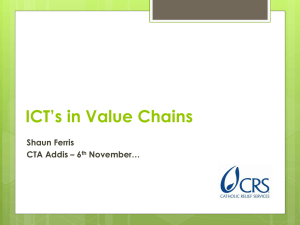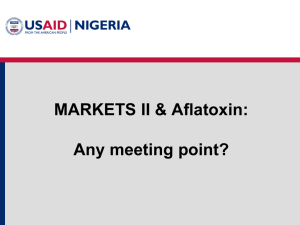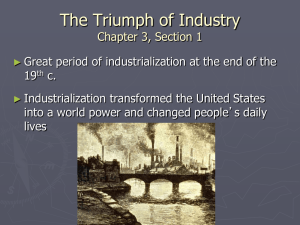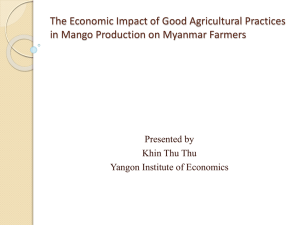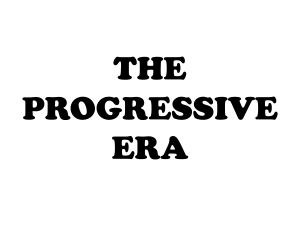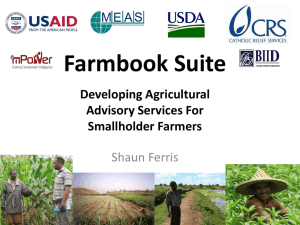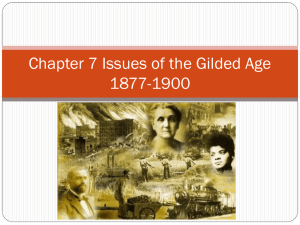View / - Centre for Good Governance
advertisement
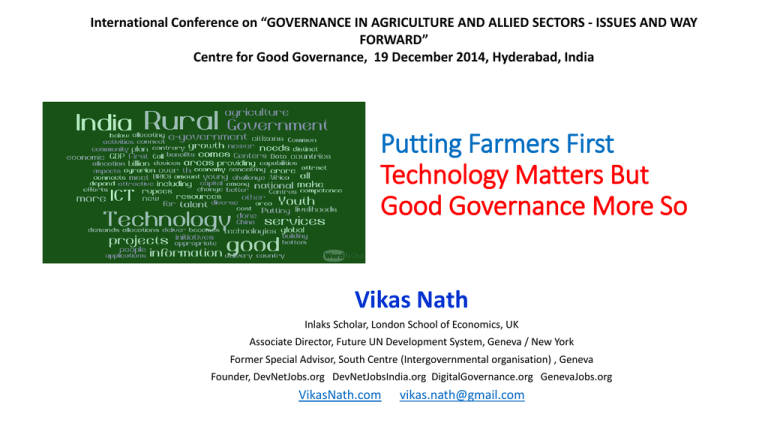
International Conference on “GOVERNANCE IN AGRICULTURE AND ALLIED SECTORS - ISSUES AND WAY FORWARD” Centre for Good Governance, 19 December 2014, Hyderabad, India Putting Farmers First Technology Matters But Good Governance More So Vikas Nath Inlaks Scholar, London School of Economics, UK Associate Director, Future UN Development System, Geneva / New York Former Special Advisor, South Centre (Intergovernmental organisation) , Geneva Founder, DevNetJobs.org DevNetJobsIndia.org DigitalGovernance.org GenevaJobs.org VikasNath.com vikas.nath@gmail.com Relevance of UN Agencies (Ranked by Developed and Developing Countries) For people in developing countries, Agriculture matter more than Trade. Trade is meaningless if households do not have a Surplus to trade. Source: Future UN Survey 2012 Indian Agriculture: Global Powerhouse • World's third largest agricultural producer (behind China and the US) • World’s largest producer of milk, pulses, banana and spices. • Second largest producer of rice, wheat, cotton, sugarcane, farmed fish, fruit, vegetables and tea. • In terms of net exports, world’s sixthlargest net exporter, with net exports double those of the EU-28, and rising! Source: International Agricultural Trade Report, FAS/USDA, 2013 But performs far below its potential…. • 70% of Indians live in rural areas but agriculture share in Indian economy has declined to 15 percent. • Agriculture growth rate has been around 3% over the past 20 years. • Productivity rates are very low - even in comparison to developing countries. • Too many farmers compared to available land. India uses the most land to grow rice and wheat. At Chinese levels of productivity, we could nearly double our output. It is clear that Indian Agriculture faces Ongoing and Emerging Challenges … • Food Security • Livelihoods Security • Economic Security • Environment éSecurity • National Security GDP growth from agriculture benefits the income of poor people two to four times more than GDP growth in other sectors of the economy. Need to ensure that agriculture becomes a profitable enterprise for all farmers engaged with it. Governance in Agriculture Sector Too Much Governance? Is it possible that we have too much governance in agriculture sector that it is difficult to challenge existing ways? This hinders professionalization, modernisation, productivity, innovations and significant improvement in lives of millions of farmers? Too little Governance? Is it possible that governance has overlooked agriculture and rural sector and focused more on the service sector and urban issues? This has neglected the agriculture sector and it fails to attract the attention and resources it deserves, and available resources are not optimally allocated. Or is it too much governance in some areas and too little in others? What role can ICT play in Agriculture Sector? Case A: pre-Information Technology Situation V= Value of Service derived by the Agriculture User «U» A B U1 U2 C U4 U3 V3D D U5 AGRICULTURE USERS (5) AGRICULTURAL SERVICES (A, B, C, D) Public Value of Agricultural Services = U1v1 + U2v2 + U3v3 + U4v4 + U5v5 Three ways ICT can Increase Public Value of Governance Services in Agriculture Sector • Bring more Farmers under the reach of government services • Enhance the quality of existing services being offered to the farmers • Provide new Services to farmers This is how we can put Farmers First Case B: post-Information Technology Situation G U6 U8 A B U1 U7 C E U2 U3 U4 F D U5 AGRICULTURE USERS (8) SERVICES (A, B, C, D, E, F, G) New Public Value of Agricultural Services = U1V1 + U2V2 + U3V3 + U4V4 + ... + U8V8 Role of ICT: Matching diverse Agriculture Groups with equally diverse Service Providers AGRICULTURE SERVICE PROVIDERS Urban Consumers Banks Agriculture Markets Private Companies Global Regimes WTO, WIPO I N FO R M AT I O N TECHNOLOGY Government AGRICULTURE USER GROUPS Artisans Farmers Farm Labour Agriculture Community Fishermen Livestock Herders How to increase public value of agriculture services using ICTs? • Land and Water Ownership • Technology and Advisory Services • Financial Inclusion • Access to Urban India • Skill Building • Become Agenda Shaper in Global Governance Improving Agricultural Land Administration Improved land administration can lead to greater farm productivity. ICTs can help by: • Digitisation of land records • Improved agriculture extension by recording information about soil types • Improved irrigation planning through data on available water source • Modernizing the legal framework (where it exists) through use of electronic certificates and digital signatures. LARASITA: A Mobile Land Titling Office in Indonesia The People’s Land Titling Service (LARASITA), a mobile land office (see image 14.2) that travels to villages to provide to property services to previously disconnected communities. The mobile office (a modified van) is equipped with laptops connected to the main land record database through wireless connectivity (WLAN). Did the gradual computerization of land registry systems across Andhra Pradesh’s 387 sub-registry offices influence access to credit? Quarterly data on credit disbursed by all commercial banks over 11 years (1997–2007) were aggregated at the sub-registry office level and examined in light of the date when the land registry system shifted from manual to digital records. Computerization had no credit effect in rural areas but led to increased credit supply in urban areas. At the same time, estimated impacts from reduction of the stamp duty (a tax levied on legal instruments and transactions such as those involved in sales of land or mortgages) are much larger, suggesting that, without further changes in the property rights system, impacts of computerization will remain marginal. Source: Deininger and Goyal 2010, World Bank Strengthening of Local Institutions and Farmer Participation Greater use of ICTs can lead to: • Improved Transparency and Participation: More farmers can become more aware of schemes and subsidies available to them, and can avail them. • Greater Accountability and Reduced Corruption: By making information available to all users instead of select few. • Better procurement: E-Tendering and procurement can bring greater competition, reduce transaction costs, and bring improvement in products/services procured. • Participatory Planning and Budgeting: Easier access to information and greater accountability of government officials can encourage greater participation by farmers. The “West” is ahead of the “Rest” Global e-Gov Leaders 2012 /2014 ....as per several global rankings Regional e-gov Trend (2002 - 2012) Source: UNPAN 2012, Waseda University Institute of e-Government (Japan), Rutgers University (USA) No developing countries – what are the reasons? Good Governance : Prerequisite or Outcome of use of ICTs United Kingdom Source: World Justice Project, 2012- 2013 India For Top-ranking countries: Open and transparent government, absence of corrupton, rule of law were largely existing when they embarked on use of IT in Governance. Developing countries: Are trying to achieve them as outcomes of use of ICT in governance Access to Financial Services Lack of access to financial services is a major impediment for farmers to make investments in improving productivity and choosing the optimal cropping pattern. Farmers end up growing crops based on their financial and technological capability rather than based on market demands. Financial Services required by Farmers: • Credit • Savings • Insurance • Transfer and Payment facilities to easily accept and make payments ICT and Financial Services ICTs can : • Ensure all farmers have a bank account. • Provide range of banking services in rural areas where no bank or institution may be physical present. • Provide services which are timely and customised to farmers. Example: Financial products with a time horizon extending over multiple crop cycles. • Can provide banking services to even those who are not literate. Nigeria: E-Wallet Scheme for Farmers (Targeting Subsidies) • Farmers in Nigeria receive 50 per cent subsidy on their farms inputs. • E-Wallet allows farmers to register and receive SMS alerts on their mobile phones and proceed to the nearest agro-dealers to redeem the inputs with 50 per cent value of the inputs price. • Earlier only 11% of the farmers received subsidised fertilisers while rest were sold in open market. Now over 80% of farmers receive them. Brazil: Bolsa Escola Conditional Cast Transfer / Monthly payments on education to poorer families, especially in rural areas. The Bolsa program, which started in the 1990s and expanded rapidly in 2001 and 2002, provides monthly cash payments to poor households if their children (between the ages of 6 and 15) are enrolled in school. Success replicated in several countries and in different sectors including agriculture. Online Payments: 2011 GEAR study (Developing countries progressing in Financial Services) (by Visa International in 64 countries) Source: Visa International http://corporate.visa.com/_media/2011_GEAR_Study_Overview.pdf Innovative Government Services and Service Providers Need to encourage formation of dot.gov and not just dot.com either through Public-Private Partnership route or Entrepreneurship / Start-Up Route • • • • • • • Weather Forecasting Crop Insurance / Livestock Insurance Green / Climate Credits Water Markets Organic Certification Traceability / Geographical Indicators Linking Farmers to Urban / Global Markets Skymet.net: Private Sector run Weather Forecasting Service Can provide accurate forecasts at the village level. Skymet can provide reliable seasonal forecast for the next 7 months, including the monsoon. Skymet is venture backed by Omnivore Partners (www.omnivore.vc). Omnivore Partners is a venture fund investing in early stage agricultural technology ("agtech") companies in India. Traceable Coffee: Linking Farmers and Farmer Cooperatives to Global Markets Pachamama Coffee Cooperative Of Small-Scale Coffee Producers www.traceablecoffee.org/ Linking Farmers to Consumers….. profitably Australia: Waterfind / Water Trading Made Easy Promoting better valuation, conservation and efficient use of water. Africa: ESOKO / Apps for Agriculture Proof of Good Governance in Agriculture India is set to become the youngest country in the world by 2020 when the median individual will be just 29 years. Who wants to be a Farmer? By Choice? Pride, Profit, Professionals in Agriculture: Mentorship, Incubation and Seed Funds Because of Lack of Choice? Lack of other opportunities, High Rural-Urban divide, Focus on economic growth but without creation of jobs, Neglect of youths International Conference on “GOVERNANCE IN AGRICULTURE AND ALLIED SECTORS - ISSUES AND WAY FORWARD” Centre for Good Governance, 19 December 2014, Hyderabad, India Putting Farmers First Technology Matters But Governance More So Thank You Vikas Nath Inlaks Scholar (London School of Economics, UK) Associate Director, Future UN Development System, Geneva / New York Former Special Advisor, South Centre (Intergovernmental organisation) , Geneva Founder, DevNetJobs.org DevNetJobsIndia.org DigitalGovernance.org GenevaJobs.org VikasNath.com vikas.nath@gmail.com

